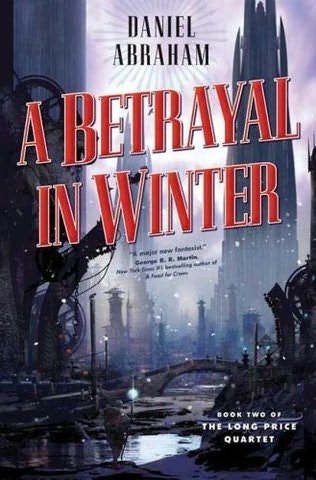A Betrayal in Winter is the second book in Daniel Abraham’s Long Price Quartet, and it focuses on the struggle for the succession in the winter city of Machi. If a Khai’s sons are supposed to kill each other for their inheritance, what happens if you’re an ambitious Khai’s daughter? Again I’m delighted with the worldbuilding, and the way the magic is integrated with everything else, and the economics actually makes sense. This is a story of love and honour and betrayals.
A Shadow in Summer was about Saraykeht and the loss of an andat, with Otah and Maati about fifteen. The central character for that book only was the old woman accountant Amat, and one of the themes was forced abortion. A Betrayal in Winter is about Machi, with Otah and Maati about thirty. The central character for this book is the young Idaan, daughter of the Khai, whose tragic flaw is that she wants to be a son and have significance. The parallel theme is feminism—these are very feminist books, I’m surprised nobody noticed them for the Tiptree. The andat in A Betrayal in Winter is Stone-Made-Soft, a very different kind of andat from A Shadow in Summer‘s Seedless. He’s much more in tune with his poet, Cehmai, but still bound in an eternal struggle. The book isn’t parallel. There’s a Galtic plot (doing some subtle setting up for the events of An Autumn War), but it doesn’t succeed, and the andat is still safely in Machi at the end.
I was surprised the first time at the fifteen year gap between books. Some of the significant things that happened in that time were mentioned early on, others not until later. The continuing characters had changed and matured. I think these gaps were an excellent idea. They help make the volumes self-contained, as well as giving a wider angle on the world. The world feels as if things do actually change. It also has fun but interesting geography. Machi is a winter city, with underground tunnels and impossibly high towers, raised by the andat’s magic.
I thought quite a lot about the title. In A Shadow in Summer, the shadow is clear to see. Here, it’s not as obvious. It’s not that there’s any lack of betrayals. In Tooth and Claw I have a chapter called “A proposal” and another called “A confession” and then subsequent ones called “A second proposal” and “A second confession” and so on until there’s eventually a chapter called “In which the narrator confesses to having lost track of the number of proposals and confessions.” Both times I read A Betrayal in Winter, I tried to keep track of how many betrayals there were, both times I failed. However, since Mr. Abraham thought it significant to mention one, I wonder which one in particular he had in mind? Was it Idaan’s betrayal of her whole family, which drives the plot? Or was it Maati’s betrayal of Otah to the Khai? Was it Sinja’s betrayal of his contract—I didn’t even count that one the first time, because I didn’t know Sinja was going to be an important character in the later books. Could it have been Idaan’s betrayal of herself to Cehmai? I eventually decided that the most significant betrayal was probably Cehmai’s betrayal of Idaan at the end, but that was sparked by Stone-Made-Soft’s betrayal of Cehmai… Almost everyone betrays someone, even Otah nearly betrays Kiyan by escaping, though he turns around.










